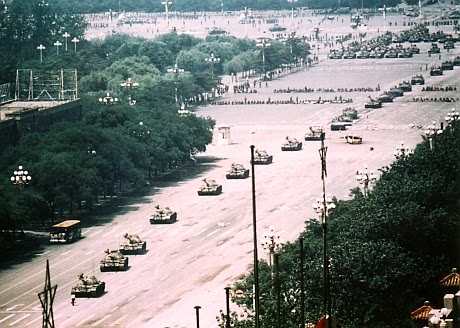The Tiananmen Square protests of 1989
Type
59 tanks on Tiananmen Square.
“The Tiananmen
Square protests of 1989, commonly known as the June Fourth Incident or more accurate language 八九民运 in Chinese, were student-led popular
demonstrations in Beijing which took place in the spring of 1989 and received
broad support from city residents, exposing deep splits within China's
political leadership. The protests were forcibly suppressed by hardline leaders
who ordered the military to enforce martial law in the country's capital. The crackdown that
initiated on June 3–4 became known as the Tiananmen Square Massacre or the June 4 Massacre as troops with assault rifles and tanks inflicted
casualties on unarmed civilians trying to block the military’s advance towards Tiananmen
Square in the heart of Beijing, which student demonstrators had occupied for
seven weeks. The scale of military mobilization and the resulting bloodshed
were unprecedented in the history of Beijing, a city with a rich tradition of popular
protests in the 20th century.
The Chinese government condemned the protests as a
"counter-revolutionary riot", and has prohibited all forms of
discussion or remembrance of the events since. Due to the lack of information
from China, many aspects of the events remain unknown or unconfirmed. Estimates
of the death toll range from a few hundred to the thousands.
The protests were triggered in April 1989 by the
death of former Communist Party General Secretary, Hu Yaobang, a liberal
reformer, who was deposed after losing a power struggle with hardliners over
the direction of political and economic reform.
University students who marched and gathered in Tiananmen Square to mourn
Hu also voiced grievances against inflation, limited career prospects, and
corruption of the party elite. They called for government accountability,
freedom of the press, freedom of speech, and the restoration of workers'
control over industry. At the height of the protests, about a million people
assembled in the Square.
The government initially took a conciliatory
stance toward the protesters. The student-led hunger strike galvanized support
for the demonstrators around the country and the protests spread to 400 cities
by mid-May. Ultimately, China's paramount leader Deng Xiaoping and other party elders
resolved to use force. Party authorities declared martial law on May 20, and
mobilized as many as 300,000 troops to Beijing.
In
the aftermath of the crackdown, the government conducted widespread arrests of
protesters and their supporters, cracked down on other protests around China,
expelled foreign journalists and strictly controlled coverage of the events in
the domestic press. The police and internal security forces were strengthened.
Officials deemed sympathetic to the protests were demoted or purged. Zhao
Ziyang was ousted in a party leadership reshuffle and replaced with Jiang Zemin.
Political reforms were largely halted and economic reforms did not resume until
Deng Xiaoping's 1992 southern tour. The Chinese government was widely condemned
internationally for the use of force against the protesters. Western
governments imposed economic sanctions and arms embargoes.”( Tiananmen Square protests of 1989 from Wikipedia, the free encyclopedia,
http://en.wikipedia.org/wiki/Tiananmen_Square_protests_of_1989)
Actually this event is still kept as a “secret” by the Chinese government
currently. Individual could do nothing but just recalled these horrible memory
sometimes, and everybody just moves on. Chinese people are too afraid to say
something true or do something that the government not allow stealthily. As a
consequence, people just go on their normal life. The government does not even give
us the opportunity to find the truth. We can’t go on Wikipedia in China, and
once we search the key words of “Tiananmen Square protests of 1989”, we get
nothing but “According to the relevant laws and regulations and policies, some
of the search results have not been displayed.” However, no one could find what
those laws exactly are. And “some of” means all of. By the way, we could not even
get on Google in China, we have our own search website called “Baidu” controlled
by the government which is almost the same copy of Google.
I was born in 1994 so I just missed this huge even fortunately. My
father told me about this event. He was one of those students who sat on the
Tiananmen Square protesting. And finally the government army was sent with tanks
and machine guns. They just fired to the student on the Tiananmen Square which
is considered as a most sacred place in China where Chairman Mao proclaimed the
founding of the People’s republic of China. What a sarcasm! Luckily my father
sat very back of the students, he ran under the bullets and survived. Some of
his friends and classmates just got the bullets and dead. He even became a federal
employee and worked for government. He knows the evil of the government but he
can do nothing but earn a life from being a federal employee. Additionally,
there are many people who are just like my father. They have professional
ethics so they would not say anything about the event in public but they could
tell their family.
I was told by my father when I was in high school. And I had already get
paralytic about our government doing these kinds of things. I just don’t care
about them. What I only want is live my own life and make it as good as
possible under the “suppress” of the government, like many people do.

No comments:
Post a Comment